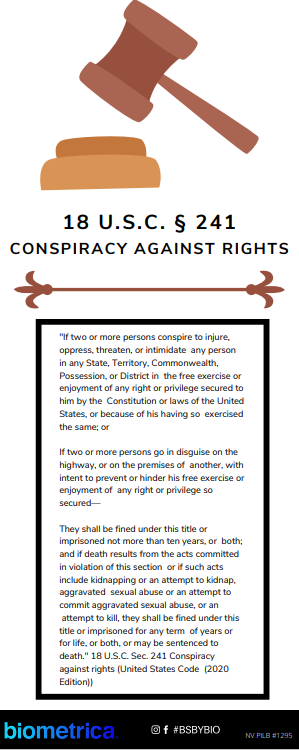
Can You Go to Prison for Posting a Meme?
By Charlotte Spencer
Yes, you can, and Douglass Mackey, aka Ricky Vaughn, recently found that out the hard way. Most people are aware of the fact that posting certain content online, such as child sexual abuse imagery, or “true threats” can get them in trouble with the law. Many, though, are probably not aware of the particular law that Mr. Mackey ran afoul of. 18 U.S.C. §241 criminalizes conspiring to deprive those in the United States of their rights under law.
If two or more persons conspire to injure, oppress, threaten, or intimidate any person in any State, Territory, Commonwealth, Possession, or District in the free exercise or enjoyment of any right or privilege secured to him by the Constitution or laws of the United States, or because of his having so exercised the same…
18 U.S.C. Sec. 241 Conspiracy against rights (United States Code (2020 Edition))
In other words, if you conspire to do something designed to deprive others in the United States of their rights and privileges under the Constitution, or other U.S. law, you have committed a crime. Most probably don’t think of laws like this when thinking about ways they could get in trouble online, because the law doesn’t specifically focus on or mention online content. In fact, the original law predates the internet. It’s important to remember, however, that if you can get into trouble for doing something offline, you can also get into trouble for doing that thing online.
What right Mr. Mackey specifically is accused of having conspired to deprive others of is the right to vote. In a complaint, available here, the FBI outlined a conspiracy Mr. Mackey engaged in to trick would-be-voters into attempting to submit votes by text and on social media, instead of by official means that would actually be counted in the 2016 election. Text records showed that at least 4,900 people attempted to vote by text at the number specified in the memes, approximately 4,850 of which were attempting to vote for the candidate who Mr. Mackey was attempting to hurt in the vote count.
The complaint does not give a count of how many were also tricked into attempting to vote online, though the text count suggests that it could be a significant number. Mr. Mackey and his co-conspirators were able to predominantly take votes from one candidate by using that candidate’s logo, slogans, and branding in posts, and posting content falsely claiming to be from that campaign. At one point he also posted something falsely claiming that the State Department was coordinating with social media platforms to allow voting online.
If convicted Mr. Mackey and his co-conspirators could face fines and up to 10 years in prison each. This may surprise some, but to understand why this is, consider what would happen if he had pulled a similar scheme offline. If he and his “team,” as he referred to them, had canvassed door to door falsely claiming to be with a rival political campaign, or falsely claiming to be speaking for the State Department, it becomes immediately clear that this could get them into a great deal of trouble. If they had then distributed false information designed to prevent people from voting in a way that would be counted this would certainly get them into trouble. What Mr. Mackey and his “team” failed to realize was that just because their activity was conducted online, this did not make it any less illegal.
Mr. Mackey was arrested January 27, 2021, and was later released on a $50,000 bond. This case is still pending as of the writing of this. For more on this case see the Justice Department’s press release on the matter.

The writer is a lawyer and a coder, and a member of the Arizona bar. The above article only examines the technicality of the application of the law in this case. It does not examine any previous patterns of behavior by Mr. Mackey in the past. Biometrica does not condone racist, anti-Semitic bullying, or any other kind of discriminatory behavior.